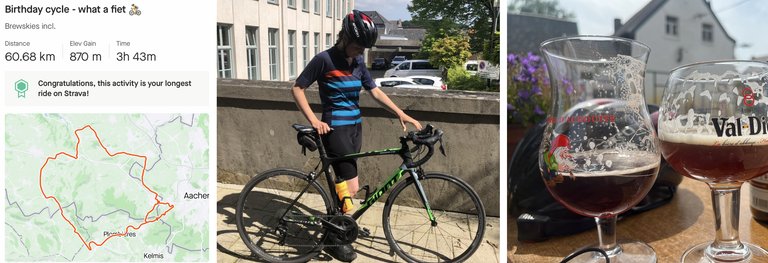Why do you run? What motivates you to get up, get dressed, and hot-foot it out the house? Is it the feeling of the tarmac beneath your feet? Is it the cool breeze that whips up your hair? Is it the bloom of endorphins that pump through your chest when you match a challenging pace? In a world that spins around far too quickly, there exists a simple yet profound act that brings solace to the restless spirit – running. The pavement becomes a stage, and each stride tells a story… a narrative of resilience, determination, and liberation.

Having [fervently] despised exercise in my teens – first hit in dodgeball, last-picked for the relay team, and the only child to launch herself directly into the high-jump pole - it seems almost surreal to look on my life in the present and comprehend that this here being is I. The Alex who had two left feet in jazz class. The Alex who would exit out of the beep test as quickly as she’d entered it. The Alex who faked a sore leg to get out of a 5K “fun” run. This very same Alex is dipping her toes into the cycling scene, #running the Edinburgh Half-marathon, and marches to the tune of a newfound interest: fitness.

The last few weeks have seen some momentous shifts in my life. A colleague at work told me brain chemistry can significantly transform in lieu of substantial change. Further research evidenced that neurotransmitters associated with pleasure and reward decrease after disruption, contributing to feelings of sadness and withdrawal. The release of oxytocin – the bonding hormone – decreases rapidly. Helen Fischer’s research on attachment emphasises the role of endorphins, the body’s natural painkillers, which withdraw from a reward system that once associated something good with something that is now lost. And Functional Magnetic Resonance Imaging (fMRI) studies, conducted by researchers like Lucy Brown, have shown that areas of the brain associated with reward and motivation, such as the ventral tegmental area, can exhibit changes in activity when profoundly hurt.
Through all this I’ve come to rely on exercise as a form of kinetic meditation, as well as a means to help me sleep. The brain’s capacity for neuroplasticity, as described by Norman Doige, allows for adaption and recovery. Ben Martynoga further explains in the video below that when the brain is forced to rewire itself it can produce [the ungainly named] brain-derived neurotrophic factor, a really strong medicine for the brain in its ability to encourage general wellbeing and positivity. So, why not form fresh neural connections and facilitate emotional healing with new habits?
When the pounding heart becomes a metronome, each breath and footfall beneath the open sky a triumph; when the wind whispers through the trees and the foxes tread the asphalt beside you; when the road wanes ahead in the distance but you endure because home is on the horizon… I’ve found that worries seem to dissolve. The mind attunes to the cadence of the moment… and the clutter fades away in the sanctuary of silence.




Whether you run for your physical health, your mental health, to manage weight, to challenge yourself, to bridge social connections... Whether you run for alone time and self-reflection, for a competition, for exploration, or simply to establish a routine... Whether you run for fun, for adventure, for dynamism and versatility... I get it now. I salute you.
Any form of exercise speaks to that innate human desire for freedom and exploration. Taking your brain for a run – incubating, zooming out, disengaging and letting your unconscious mind chew away at a problem – can work wonders. As the weather improves, I anticipate that the sense of satisfaction and reward will be similarly profound when I can hit the road on my bike.
If all works out this year, my goal is to get to Norway, where I hope to chase the Northern Lights on two wheels… fulfil a lifelong dream. Achieving this, however, hinges on attaining a suitable level of fitness. But I’m confident I’ll get there. After all, the little Alex who couldn’t shoot a straight set to save her life has discovered that exercise isn’t all that bad actually.
It really rather makes her quite happy.
Take care Hivers.
And keep moving!
 The River Forth, Edinburgh
The River Forth, Edinburgh
It's a while since I read Helen Fischer's work, but I remember thinking ah-ha!
I love that idea of literally inventing yourself, growing new neurons. I have imagined sometimes when I'm involved in intense learning that I can hear those neurons and synapses growing by the second.
I love walking, sometimes when I go out, I don't want come back into the house, I'm enjoying being outside so much.
Ah, another great comment @shanibeer!! 💛 I can relate. Such empowering feelings - both! When neurons snap together during moments of intense learning, and long lengthy walks.
Congratulations @actaylor! You have completed the following achievement on the Hive blockchain And have been rewarded with New badge(s)
Your next target is to reach 100 comments.
You can view your badges on your board and compare yourself to others in the Ranking
If you no longer want to receive notifications, reply to this comment with the word
STOPTo support your work, I also upvoted your post!
Check out our last posts:
Thank you ☺️💫
Keep up the fantastic work @actaylor! Your dedication and hard work will pay off when you reach your target.